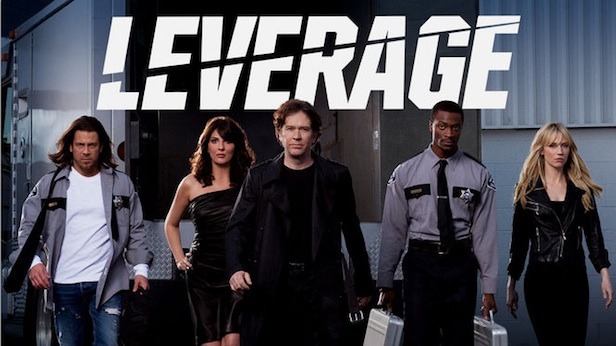
Leverage – Most simply put, Leverage turns Ocean’s Eleven into a semi-serialized television format. On one level, that sounds dumb – doesn’t it take a long time to set up heists like that? – but Leverage often makes it work through actual, excellent plotting. Of course, I will never claim Leverage is the best show on Earth, or that it somehow transcends its origins as a show designed for pure entertainment, but I can say anyone interested in the basic concept will have quite a good time!
Well, I guess it’s not quite Ocean’s Eleven, since the “crew” here consists of people who…commit crimes…to rectify injustices outside of the law. Leverage follows a five-person team: a thief, a grifter, a hacker, and a retrieval specialist, led by former insurance investigator Nathan Ford, who use their skills to fight corporate and governmental injustices inflicted on ordinary citizens. The show establishes this premise on the first episode, and proceeds from there. Light sprinklings of serialized storytelling appear in fits and starts, as well as references to previous episodes, but there’s pretty much zero barriers to entry for anyone who simply stumbles upon Leverage while channel-surfing (or Netflix binging, my preferred method of watching shows like this).
And, in a way, I sorta prefer it with a premise like this. Each episode begins, proceeds, and ends in pretty much the same way. A person declares an injustice to Nathan Ford (played by Timothy Hutton, who is one of those forgotten Academy Award-winning actors – seriously). Nathan Ford, whose son died because his insurance company wouldn’t pay for treatment, basically helps people “get back” at the people who screwed them over in the first place. There’s no moral ambiguity here, which lets the show keep a light and airy sensibility, despite the fact that many laws are broken and felonies violated.
Ford recruits a crew of people who he actually used to chase around due to insurance claims around the world. Since they’re all skilled in various (illegal trades), elaborate scams can be thought up, and ways to trick their marks come into play. The show moves at a steady clip for its 40 minute run time, jamming in as many plot points, twists, and turns as it can. I mean, it is formulaic in some sense (and rarely do they ever fail, far as I’ve watched the show), but you look forward to how they’ll resolve the episode’s various threads at the end. And, most of the time, they’re creative and interesting.
They do break one of those cardinal rules of mysteries, though: you sorta have to show a gun before actually shooting a gun onscreen. Sometimes an unfilmed plot detail suddenly becomes “the reveal”, and while I understand why they do it that way, it means that the audience doesn’t really get to participate with how the ensemble actually succeeded. But, then again, Leverage doesn’t really want you to think all that hard. We’re not talking Sherlock here – more like the world’s most pleasant heist film over and over again. And hey, I’m fine with that.
A lot of that pleasantness comes from the light hearted joking sprinkled on top. It takes a good deal of effort to make an ensemble cast like this work, but each of them bring enough weird personality quirks to make for fun interactions. It’s hard to place a distinct identification on the show’s comedic sensibilities (mostly because humor is so subjective), but it works well enough for me. Despite the classification of Leverage as a “drama”, it’s pretty much anything but that in pretty much every scene. I can say I’ve laughed out loud more than a few times, and the series digs deeper into more comedic lanes as we get more familiar with the characters. Fun!
Leverage often takes the tone of the original Mission: Impossible or James Bond more than anything else, which displayed a similar penchant for a pretty bright and airy world. If you want to think of it in terms of modern-day spy films, think the complete opposite of Daniel Craig Bond, and that pretty much sums up Leverage. As the executive producer and creator of the series, Dean Devlin, said:
I just wanted to do the type of show that I grew up with and loved. I missed Mission: Impossible and The Rockford Files. Television today tends to be more dry, dark and edgy. I’m not saying it’s bad, but it’s not the type of show I was interested in. So when TNT said they wanted to get a TV show out of me, I said I wanted to do a throwback type of show. I wanted to have fun. I don’t want to live in a dark world.
And if that sounds appealing to you, give Leverage a shot. I did, and I can’t say I’m disappointed!
